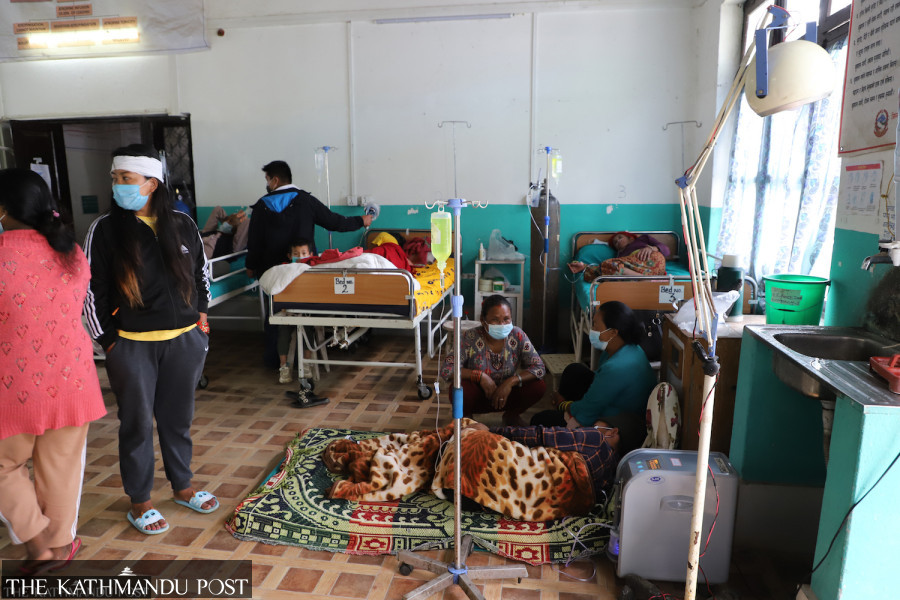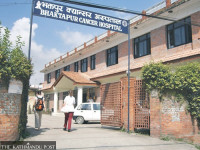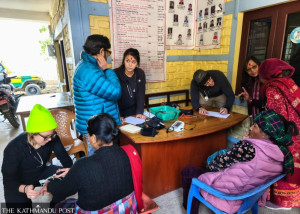Health
Health minister promises free health programmes, but agencies are struggling for small funds
Health ministry asks UNICEF for Rs700,000 needed for training health workers on mental health screening for children and adolescents.
Post Report
As Minister for Health and Population Pradip Paudel is on a spree announcing one populist programme after another, health agencies under his ministry are reaching out to aid organisations for small amounts to basic training.
Officials say they do not even have the budget to provide mental health screening training to children and adolescents, and this has delayed the planned programme.
“We have been asking aid agencies for help to carry out training programmes for health workers,” an official at the Health Ministry said, asking not to be named as he is not authorised to speak to the media. “The minister is busy unveiling new free programmes but does not bother to learn about the real problems.”
On Monday and Tuesday, Minister Paudel announced three free programmes that include free treatment for children under 14 with cancer, free treatment and health check-ups for women soccer players injured in matches, and upgrades to the Sailaja Acharya Heart Disease Centre in Biratnagar.
Last week, Paudel pledged free care for poor burn victims who cannot afford treatment. However, most health facilities offering burn care provide only basic treatments, which often puts patients' safety at risk. Since taking office three months ago, Minister Paudel has announced several other populist programmes.
While most of these initiatives—which include reducing hospital wait times, increasing government health insurance coverage to Rs500,000, and providing outpatient care on public holidays—have yet to be implemented, Paudel continues to announce more free programmes.
Experts have questioned the effectiveness and sustainability of such programmes stating that previous ministers and governments would also have made similar decisions if there were simple solutions.
“Only those who are unaware of the limitations and working style of our health system could be impressed by these populist announcements, but the reality is quite different,” said Sagar Rjbhandari, a health expert.
Many other health programmes, including nutritious food for pregnant and nursing mothers and children in Karnali Province, as well as maternal and perinatal death surveillance, among others, have been affected by budget constraints in the current fiscal year.
Health Ministry officials said they have requested UNICEF for financial help to impart mental health screening training of children for health workers.
“We need around Rs700,000 to train health workers, including doctors, nurses, and paramedics, on mental health screening for children and adolescents,” said Dr Pomawati Thapa, chief of the Non-communicable Disease and Mental Health Section at the Epidemiology and Disease Control Division. “UNICEF has responded positively to our request. A four-day screening training will be organised in the fourth quarter of the current fiscal year.”
Officials said that they plan to train 150 health workers.
“We hope that the health worker training will help reduce existing mental health problems among children and adolescents,” said Thapa. “Those serving in primary health care centres will be trained first to ensure that children and adolescents in villages will easily access the services.”
A report from the National Mental Health Survey Nepal-2020 shows that the prevalence of mental disorders among adolescents was 5.2 percent that year, and neurotic and stress-related disorders were the most common at 2.8 percent.
Likewise, the prevalence of current suicidal thoughts among adolescents was around four percent, while the rate of suicidal attempts in the same age group was 0.7 percent. The report also shows that 0.6 percent of children and adolescents were found to have been suffering from depression.
The prevalence of suicidality, including current suicidal thoughts, lifetime suicidal attempts, and the future likelihood of suicidal thoughts, was found to affect 7.2 percent of the population.
Experts say that mental health problems in children and adolescents could be several times more than what the survey portrays. They say that around 10 to 15 percent of the total children and adolescent population could have been suffering from various types of mental health issues, and due to methodological problems, the survey may not accurately portray the actual problems.
Health officials say that there are only around half a dozen child and adolescent psychiatric doctors in the country, and only a few are serving in state-run health facilities. Similarly, the major contributors to the treatment gap are societal beliefs, traditions and stigma associated with mental disorders, according to experts.
“This training will help health workers identify problems and refer patients to health facilities with child psychiatrists and psychologists,” said Thapa.
Studies show the magnitude of suffering, the burden and costs for individuals, families and societies arising from mental health disorders are alarming in Nepal.




 9.12°C Kathmandu
9.12°C Kathmandu













